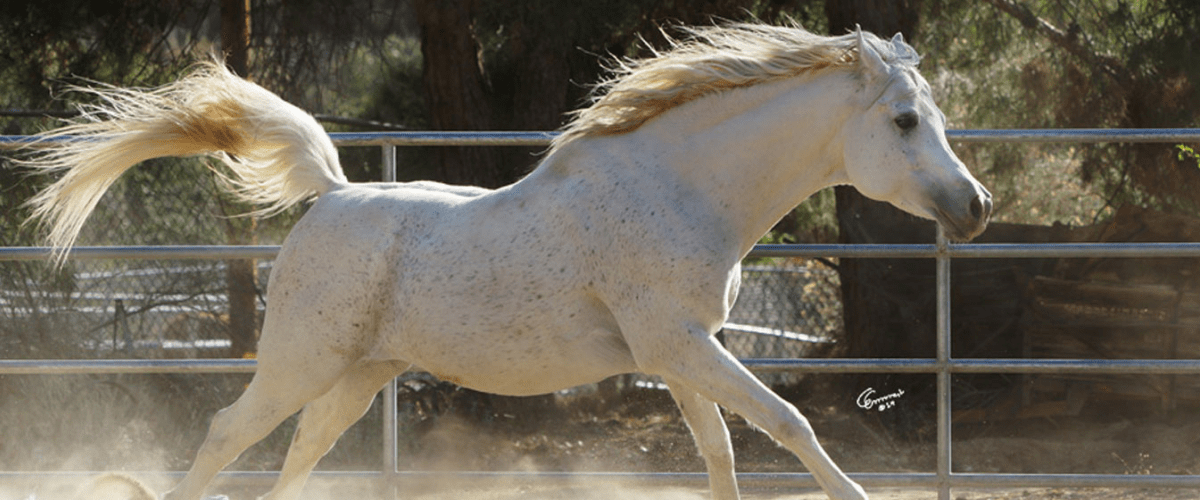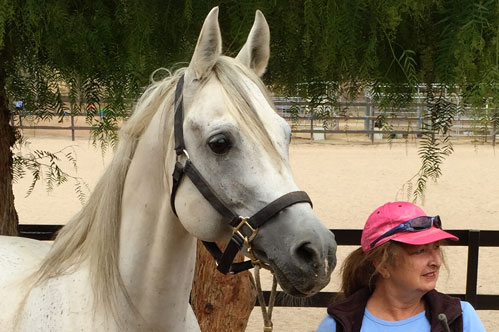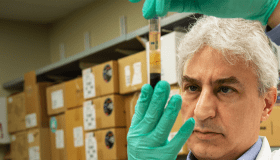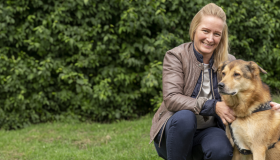
Updated November 13, 2018 – It was 10 years ago that Elizabeth McCall made a decision that would change the course of her life and bring joy to others. That decision was an Egyptian Arabian stallion named RAJALI KA. She wasn’t in the market for a horse – she had, after all, travel plans – but this horse won her heart. He was special, and he was wonderful and he was a talker, until cancer took him too soon.
Elizabeth loves sharing RAJALI KA’s life story, but she also wants to share with other horse owners the cautionary tale of his death from melanoma earlier this year.
Melanoma is one of the most common types of skin tumors found on horses. This form of cancer is especially prevalent in grey horses, reaching an incidence rate of up to 80 percent. The tumors often are advanced by the time they are diagnosed, and result in prolonged and significant discomfort for affected horses. Watching and waiting was the approach most often recommended, but a study funded by Morris Animal Foundation is changing that approach and melanoma treatment outcomes.
Dr. Jeffrey Phillips, an assistant professor of oncology and medical genetics at Lincoln Memorial University in Tennessee Dr. Phillips, decided to try a recently developed canine melanoma vaccine to treat horses with melanoma. He devised a treatment protocol, and received a grant from Morris Animal Foundation for a clinical trial.
Dr. Phillips’ study was a stunning success. He was able to show dramatic shrinkage of tumors in the majority of horses in the study (15 horses were enrolled in the initial study), and arrested tumor growth in the remaining patients. The horses also developed antitumor immune responses following vaccination. Many of the original study horses still are receiving periodic treatment, and are living active lives despite their cancer. Dr. Phillips’ results are providing hope to thousands of owners whose horses struggle with this debilitating cancer.
Unfortunately, Elizabeth did not learn about Dr. Phillips and his research until too late – RAJALI KA’s cancer had become inoperable and was aggressively spreading.
“My message to horse owners is watching and waiting is not the best treatment option,” said Elizabeth, who lives in California. “If RAJALI KA had been treated earlier, his outcome might have been different. He still might be here with me today.”

For Elizabeth, the loss of RAJALI KA was especially hard because of the special gifts her horse possessed. Much like the Mr. Ed of the old television show, RAKALI KA was a talker (though not in English). He inspired a book, and appeared as a “spokes-horse” for a brand of horse treats. In his nomination for the Arabian Horse Association’s Ambassador Award, Elizabeth wrote:
Born and bred at Kehilan Arabians in Ft. Worth, Texas, in 2001, RAJALI KA and his owner/human partner Elizabeth McCall hosted one of the first 2015 Time to Ride Pilot Events, where he demonstrated his art of “speaking on request” and entertained spectators. He appeared on social media videos to promote Time to Ride. Several short “talking horse” videos were filmed on August 30, 2017, as a special outreach to deliver the healing powers of horses to people in Texas impacted by Hurricane Harvey. Smart and charismatic, RAJALI KA was adept at fetching baseball caps, delivering flowers, and had a penchant for liberty work. For nine years straight, he audibly responded to my request “Ra-jaw-lee-ka speak!”
Upon finding Morris Animal Foundation when looking for information about equine melanoma, Elizabeth learned about Dr. Phillips and his work. Now, she wants to share with others RAJALI KA’s story and help them learn what they can do to make the world a better place for horses diagnosed with melanoma.
“It was so hard to lose RAJALI KA, but if others can learn from our experience, that would give me some comfort,” said Elizabeth. “He was a one-of-a-kind beautiful Arabian and one of the most remarkable individuals I have ever met.”




